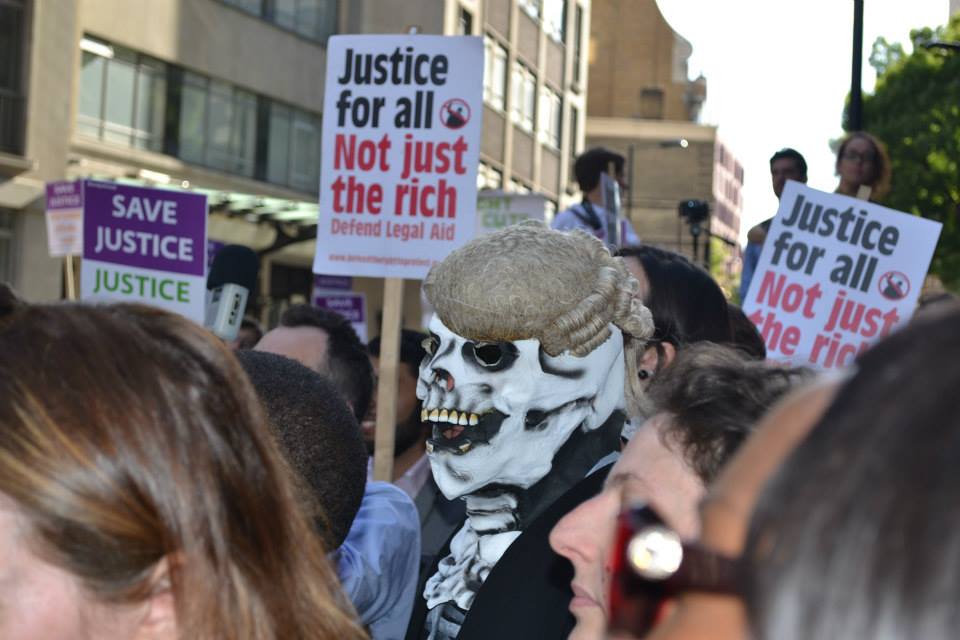 EVENT: ‘The legal aid world is, frankly, in crisis,’ warned Liz Davies, chair of the Haldane Society of Socialist Lawyers, at a lively debate on the state of the justice system last night. ‘I am pessimistic about the existence of legal aid lawyers in two or three years’ time. Civil and criminal legal aid is on its last legs. The demise of justice is happening.’
EVENT: ‘The legal aid world is, frankly, in crisis,’ warned Liz Davies, chair of the Haldane Society of Socialist Lawyers, at a lively debate on the state of the justice system last night. ‘I am pessimistic about the existence of legal aid lawyers in two or three years’ time. Civil and criminal legal aid is on its last legs. The demise of justice is happening.’
 The debate was organised by the People’s Parliament, and was chaired by Labour MP, Dr Hywel Francis. Davies shared a panel in the House of Commons with veteran human rights lawyers Michael Mansfield QC and Gareth Pierce, and actions against the police lawyer Jules Carey.
The debate was organised by the People’s Parliament, and was chaired by Labour MP, Dr Hywel Francis. Davies shared a panel in the House of Commons with veteran human rights lawyers Michael Mansfield QC and Gareth Pierce, and actions against the police lawyer Jules Carey.
Opening the debate, Francis, who also chairs the Joint Committee on Human Rights , said that he was ‘struck’ by the fact that when the justice secretary, Chris Grayling, gave evidence to his committee on the legal aid cuts, his responses to most questions were based on cost. Quoting Oscar Wilde, Francis said: ‘Grayling is someone who knows the cost of everything and the value of nothing.’
Michael Mansfield QC echoed Francis’ sentiments, arguing that ‘we are living in a morally and politically bankrupt society.’ ‘Most people are now unable to fight their corner because of the legal aid cuts,’ he said, expressing his outrage at the ‘dismissive attitude’ of MPs and the government’s ‘steamroller approach’ to defending ‘indefensible’ judicial review claims with public money, whilst refusing to pay for legal aid.
Mansfield said the government’s refusal to grant legal aid for an inquest into the death of mother of six ‘Cherry’ Groce, whose shooting sparked the Brixton riots in 1985, was ‘an absolute disgrace’. That inquest, he said, is ‘the simplest of situations where a family should have representation funded by the state’.
 Jules Carey, formerly of Tuckers Solicitors and now at Bindmans, told the People’s Parliament that the ‘assault on justice’ started with Tony Blair. ‘New Labour messed with the meaning of justice,’ said Carey. By introducing ASBOs, dispersal orders and control orders, and expanding the use of Fixed Penalty Notices, they were the ‘architects of pre-crime justice’, he argued. (You can read the full text of Jules Carey’s speech HERE).
Jules Carey, formerly of Tuckers Solicitors and now at Bindmans, told the People’s Parliament that the ‘assault on justice’ started with Tony Blair. ‘New Labour messed with the meaning of justice,’ said Carey. By introducing ASBOs, dispersal orders and control orders, and expanding the use of Fixed Penalty Notices, they were the ‘architects of pre-crime justice’, he argued. (You can read the full text of Jules Carey’s speech HERE).
‘If New Labour’s assault on justice resulted from a lack of ideology; and I believe it did; then this government’s assault on justice is because of its ideology,’ said Carey. ‘The coalition has repeatedly demonstrated that it does not believe that we should ‘all’ have access to the courts or legal advice, or that we should be treated equally before a court, or have our cases heard in public.’
Carey also warned that the celebration of the 800th anniversary of the Magna Carta at the UK Global Law Summit next year ‘won’t be a huge celebration of justice’ because ‘our proud legal history is coming to an end.’
‘If the public do not unite to defeat these justice cuts, then we will lose justice, the government will lose the £3.5billion it makes from selling our legal services to overseas clients and the Global Law Summit next year will be nothing more than a ‘justice’ branded junket, offering Runnymede mugs and Magna Carta mouse mats.’
Jules Carey
Moral crisis
Gareth Peirce, who represented the Birmingham Six, the Guildford Four and the family of Jean Charles de Menezes, was characteristically damning in her attack on the government, as she cited the ‘evolution of power’ as the principle reason for ‘the death of justice in society.’
 ‘In a truly just society, there would be no need for lawyers,’ said Peirce. But the ‘evolution of state potential criminality’ from the police brutality during the miners’ strikes to the killing of Blair Peach at a protest in Southall in 1979, to the Orgreave and Hillsborough disasters, has led us to a moment of ‘moral crisis’, said Peirce.
‘In a truly just society, there would be no need for lawyers,’ said Peirce. But the ‘evolution of state potential criminality’ from the police brutality during the miners’ strikes to the killing of Blair Peach at a protest in Southall in 1979, to the Orgreave and Hillsborough disasters, has led us to a moment of ‘moral crisis’, said Peirce.
‘If this is a war, and the government is the enemy, you have to have some sort of armament to assert that what they’re doing is illegal,’ she said. ‘In that context, we ought to look at the death, the destruction of legal aid.’
Liz Davies – a housing and public law barrister at Garden Court Chambers – reminded attendees that they shouldn’t just concern themselves with the government’s latest round of cuts to criminal legal aid, as the cuts to civil legal aid that were implemented last year under the Legal Aid Sentencing and Punishment of Offenders Act (LASPO), were ‘just as pernicious as the criminal cuts.’
‘Legal aid is becoming less and less available,’ said Davies. When civil legal aid was introduced in the late 1940s, 80% of the population were entitled to it, but by 2008 that had reduced to just 29% of the population, she added.
‘Most wickedly of all’, LASPO has taken away legal aid for welfare benefits, said Davies, the effect being that people are being ‘formally excluded from going to court and defending their rights.’
After speeches from all four members of the panel, the debate was opened up to the floor. Rhona Friedman – a solicitor at Bindmans and co-founder of the Justice Alliance -issued a plea to the public ‘not to leave it to lawyers to save legal aid’, and encouraged attendees to do their bit by targeting their local press, writing to their MPs and signing the Justice Alliance petition.
When two attendees criticised the panel for ‘wearing their hearts on their sleeves’ and pontificating about what was wrong with the justice system without actually putting forward ideas on how to solve the issues, Pierce responded by encouraging them to come to her firm for a day to see the work that she – and other legal aid lawyers – are doing on daily basis.
Echoing Friedman’s plea for the public to join in the campaign to save legal aid, she said: ‘We’re battling the state but the people out there need more than us.’
Thanks to People’s Parliament and STRIKE! Magazine for pics.







